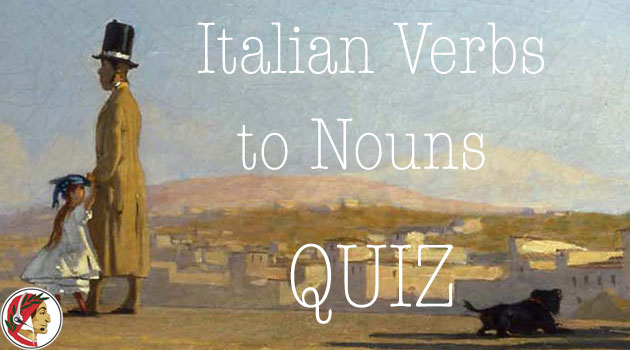Learn how we can turn Italian verbs into nouns. With a Quiz.
Second lesson about the use of prefixes. Today we are looking into a different set of prefixes. Verbs turning into nouns. Look at the examples:
- insegnare –> insegnamento (nouns indicating the action)
- lavorare –> lavoratore (nouns indicating the “agente”)
Two examples represent two different sets of distinct nouns.
In the first case, we obtain the name of the action from the verb.
In the second, the result is the name of the “agente,” which is the person or the object doing the action described by the verb. The worker works…
In case you want to look up the exact definition, we call this family of nouns “nomi deverbali.” You don’t need to remember this.
As you know, the present participle of the verb insegnare is insegnante, which means teacher. The Italian present participle of most verbs converts into a noun or an adjective, depending on the use of the word. Do you now have a little indicator that words ending in —ante or —ente could be a noun, specifically the “person (or object) who does what the verb says”? Insegnante is “the person who teaches.”
What you need to remember are the suffixes below and how they interact with Italian verbs to create nouns.
Please note, there are no consistent rules; however, you can spot some patterns and follow your instinct. Experience will give you the right solution. I’ll try to use new words; look them up if you don’t know their meaning.
Nouns indicating an action
- -zione
sparire –> sparizione
tentare –> tentazione
operare –> operazione
privare –> privazione
- -sione – a variation of -zione
collidere –> collisione
vedere –> visione
deludere –> delusione
invadere –> invasione
- -mento
sentire –> sentimento
insegnare –> insegnamento
godere –> godimento
affidare –> affidamento
- -anza
abbondare –> abbondanza
perseverare –> perseveranza
tollerare –> tolleranza
somigliare –> somiglianza
- -enza
diffidare –> diffidenza
divergere –> divergenza
esistere –> esistenza
dirigere –> dirigenza
- -aggio
salvare –> salvataggio
dosare –> dosaggio
lavare –> lavaggio
atterrare –> atterraggio
- -eggio
noleggiare –> noleggio
saccheggiare –> saccheggio
parcheggiare –> parcheggio
pareggiare –> pareggio
- -ura
acconciare –> acconciatura
cuocere –> cottura
pitturare –> pittura
pungere –> puntura
- -io (stress on “i”) common for background noises and lights
mormorare –> mormorio
luccicare –> luccichio
formicolare –> formicolio
ronzare –> ronzio
- -ato, -ito, -ata, -ita, -uta (past participles turned into nouns)
certificare –> certificato
dettare –> dettato
appetire –> appetito
spartire –> spartito
abbuffare –> abbuffata
nevicare –> nevicata
dormire –> dormita
salire –> salita
cadere –> caduta
valere –> valuta
Nouns indicating an “agent”
- -tore / -trice
agire –> attore – attrice
giocare –> giocatore – giocatrice
lavorare –> lavoratore – lavoratrice
dirigere –> direttore – direttrice
- -sore
difendere –> difensore
comprimere –> compressore
aggredire –> aggressore
invadere –> invasore
- -ante (Present Participle)
cantare –> cantante
migrare –> migrante
ignorare –> ignorante
bagnare –> bagnante
- -ente
studiare –> studente
dipendere –> dipendente
consultare –> consulente
confidare –> confidente
- -one / -ona (pejorative / argumentative noun)
chiacchierare –> chiacchierone – chiacchierona
frignare –> frignone – frignona
brontolare –> brontolone – brontolona
maneggiare –> maneggione – maneggiona
- -ino (often times a job or a tool)
spazzolare –> spazzolino
spazzare –> spazzino
galoppare –> galoppino
bagnare –> bagnino
- -toio (name of places or tools)
lavare –> lavatoio
annaffiare –> annaffiatoio
fasciare –> fasciatoio
serbare –> serbatoio
- -torio (mostly places)
consultare –> consultorio
sanare –> sanatorio
dormire –> dormitorio
ambulare –> ambulatorio
Please have a second look. Learn how we change verbs into nouns and try the quiz. Suffixes are very useful for expanding your vocabulary.
The quiz does not include all the possible options. f you added a valid noun which is not in the quiz, please write it in the comments and I’ll add it if it makes sense.
Enjoy.
✍🏻
Italian Verbs into Nouns
Basic prefixes
Quiz
LOADING QUIZ…
(continues …)
This is a “freemium” quiz. Log in or subscribe at no cost.
Get new free Italian language quizzes and your results in your inbox.
Italian Verbs into Nouns
Basic prefixes
Quiz
👩🏻🏫
Please log in or subscribe to read the blog and try the quiz
Login
Subscribe
- Access to our “freemium” content: lessons and quizzes
- Get new lessons in your inbox
- Get your quiz score by email
Painting: Telemaco Signorini – L’alzaia – 1864 (dettaglio)



Grazie Riccardo, that made for a good vocabulary lesson.
Prego.
Interessante. Certe parole sono facili, altre,non tanto.
Sì, ho messo alcune parole difficili. Altrimenti si impara poco. Ciao.